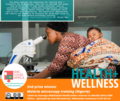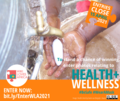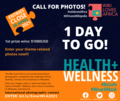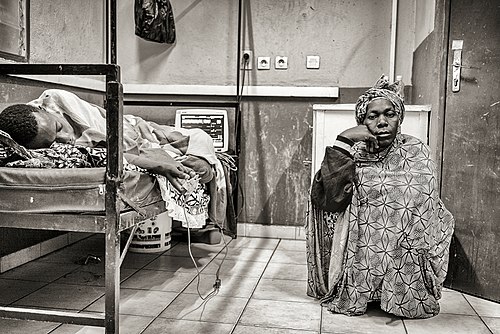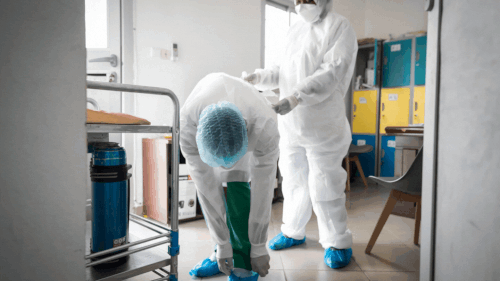Commons:Wiki Loves Africa 2021/Results and best practices
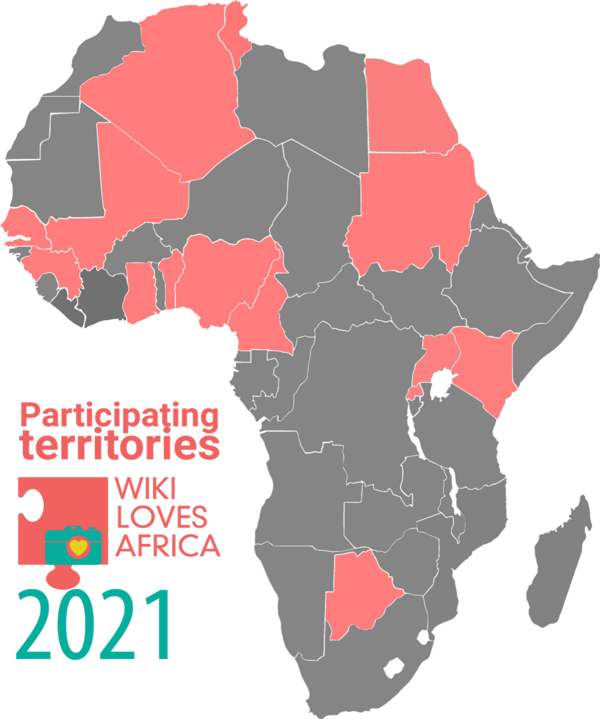
This page gives a description of how Wiki Loves Africa 2021 was organised, the outcomes, and some of the important lessons we drew.
See also
- Results and best practices 2014
- Results and best practices 2015
- Results and best practices 2016
- Results and best practices 2017
- Results and best practices 2019
- Results and best practices 2020
- Results and best practices 2021
- Results and best practices 2022
- Results and best practices 2023
Introduction
Wiki Loves Africa - the 7th iteration - was held from 15th February until 30th April 2021. The initial dates of the contest were decided on by the Wiki Loves Africa organizers community via a poll on Telegram. The theme was chosen as Health+Wellness giving the COVID-19 necessitated people to demonstrate healthy activities they were engaged in during the pandemic and feedback offered on the m:Wiki Loves Africa 2020/Survey.
This year, 21 communities officially took part in preparing events and creating local noise around the contest. As usual, the media competition accepted entries from across Africa, and from people beyond Africa, as long as the images represented African-related material or content.
Due to the use of our Telegram group over Facebook group or email, there was a lot more engagement from the local organizers. This meant decisions could be taken quickly, new members onboarded more rapidly and by more old-timers; but it was also way more pleasant!
- Local organizers were rapidly responded to, and their challenges resolved rapidly too. One instance was when Boris Bahire who was the organizer for Wiki Loves Africa 2021/Rwanda, approached our Communication, Database and Community support Ceslause Ogbonnaya on telegram, with a problem of an embedded image link that wasn't showing. Apparently his Source editing icon was not showing, so he couldn't embed the image link via source editing, as the Visual editing was hiding the image. Ceslause Ogbonnaya told him to swiftly add ?veaction=edit at the end of the link on the browser and reload, which immediately turned the page into Source editing. Boris Bahire who didn't know of the Source editing code before then, was happy his challenge was resolved.
Main links
- Commons portal : https://commons.wikimedia.org/wiki/Commons:Wiki_Loves_Africa
- Meta portal (for organizers) : https://meta.wikimedia.org/wiki/Wiki_Loves_Africa_2021
- Website : http://www.wikilovesafrica.net
- Facebook page : https://www.facebook.com/wikilovesafrica/
- Instagram handle : https://www.instagram.com/wikilovesafrica
- Twitter handle : https://twitter.com/wikilovesafrica
- YouTube: https://www.youtube.com/playlist?list=PLvyE0yEt-BKgEUM5QlcQOwsMtpbWCbsnA
- Telegram : https://t.me/joinchat/FI9fz0pnPNiWbyyLr-YsFQ
- Mailing list : https://lists.wikimedia.org/postorius/lists/african-wikimedians.lists.wikimedia.org/
The contest resulted in 8,319 media files from 1,149 competitors in 47 countries. 76% of those competitors were new to Commons. The images have since been viewed 114,825 during April 2021, with 1,765,984 views since they were collectively submitted. Current usage of the images stands at 6.53% (543 distinct images used) (when ?).
National winners have been announced by some of the local teams. The International Jury process is over and the international winners were announced at Wikimania in August 2021.
Organization and credits
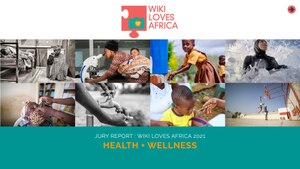
Wiki Loves Africa at a project level is run by a very small team. Being our 7th year, the competition team is well versed in the process of putting the competition together, but we must acknowledge that it is not possible to do this without the help of key people from within the community and we are endlessly grateful for their help in doing so.
As with last year, some hands-on help came from within the African community, due to in part to easier communications via the telegram channel, targetted organisational support webinars and the Wiki In Africa intern. We would like to thank the Wikimedia community across Africa (and beyond). This is as much their competition as it is ours and is intended as a platform for them to help build and sustain the growth of their communities through a celebration of local culture and experiences.
There are key people outside of the team that provide continual assistance in the set-up of the competition on, and communication across the Wikimedia projects, this is no small task - thanks to Romaine, Ji-Elle, among others. There was assistance with translation and communications, and again with image vetting and checking as they came in or helping with useful tools (our thanks go to GuillaumeG, T Cells and collectively as the first review team. And last, but by no means least, the indefatigable work of the International Jury.
Impact
Immediate impact of the Wiki Loves Africa 2021
The contest resulted in 8,319 media files from 1,149 competitors in 47 countries. 76% of those competitors were new to Commons. The images have since been viewed 1,043,327 during June 2021, with 1,318,542 views since they were collectively submitted. Current usage of the images stands at 7.16% (590 distinct images used). Other stats include:
- Participating Communities: 15 via WMF grants, 4 despite no WMF grant (Egypt, Tunisia, Zambia and Mali)
- In-person events: ? (unable to tally this due to COVID and Rapid Grant’s not yet being finalised)
- Online meetings were organized including (but not limited to):
- 1 webinar to assist increasing entrants’ understanding of the competition and
- 2 meetings with organizers of local events in order to clarify issues and concerns, discuss challenges and confirm expectations.
- 3 Online training sessions were organized :
- 2 related to Rules and howtos on Wikimedia Commons with regards to IP, licences and legal considerations in French and English,
- 1 related to Improving the usefulness of uploaded images
Full statistics for the life-span of the Wiki Loves Africa contest can be found in the table below:
| Year of competition | Images entered | People contributed | Monthly page views 06/21 | Countries participating | Total page views: 06/21 | Months tracked | Percentage useage (06/21) | Uploaders registered after competition start | % Uploaders registered after competition start |
|---|---|---|---|---|---|---|---|---|---|
| 2014 | 5,868 | 873 | 3,359,313 | 47 | 179,488,287 | 41 | 22 | 735 | 83 |
| 2015 | 7,352 | 722 | 3,379,221 | 48 | 174,841,687 | 41 | 14 | 585 | 80 |
| 2016 | 7,768 | 836 | 2,830,812 | 49 | 110,656,529 | 41 | 15 | 682 | 80 |
| 2017 | 17,874 | 2,435 | 5,427,773 | 55 | 191,592,713 | 21 | 10 | 2,307 | 88 |
| 2019 | 8,212 | 1,350 | 1,450,092 | 53 | 41,941,733 | 14 | 12 | 1,157 | 85 |
| 2020 | 16,982 | 1,904 | 4,632,608 | 53 | 61,947,527 | 1 | 20 | 1,448 | 76 |
| 2021 | 8,319 | 1,149 | 1,043,327 | 47 | 1,318,542 | 1 | 7 | 884 | 76 |
| Totals | 72,375 | 9,269 | 22,123,146 | 50.28 | 761,787,018 | - | 14.29 | - | 81.14 |
More stats available here : c:Category:Wiki Loves Africa Stats
Continued impact of the Wiki Loves Africa project
Since 2014, the Wiki Loves Africa project has achieved the following things:
- Over 72,375 images have been entered by 9,269 competitors from up to 55 countries under a free licence (CC-BY-SA) ;
- The images entered to Wiki Loves Africa are viewed nearly 43 million times each month (May 2021)
- Wiki Loves Africa’s images from the first 7 years have been viewed over 762 million times altogether (June 2021)
- Wikimedia communities from 21 African countries have hosted participation events, information sessions and training workshops; this year, the African-Brazilian community also got involved
- Over 283 participation and training events have been held up until 2021 where a spate of local COVID-inspired online events happened for the contest in early 2021;
- The competition attracts high levels of new contributors to the Wikimedia projects – an average of 82% of participants are new contributors;
- A Wiki Loves Africa prize-winning image was included in the Journeys Through Our Fragile Heritage exhibition at the UNESCO headquarters, Paris, and
- Wiki Loves Africa’s ISA tool is a pilot project for Structured Data on Commons and the winner of the WikiData Award for Best Multimedia Tool in November 2019.
note: no cumulative statistics are available prior to 2016
- Mohamed Hozyen, a prize winner for Wiki Loves Africa 2019 has been selected for the AFAC - The Arab Fund for Arts and Culture Prins Claus Fonds and Magnum Foundation Arab Documentary Photography Programme
Telling the story
Wiki Loves Africa contest has been featured in several Wikimedia conference
- Wikimania 2021 : https://www.youtube.com/watch?v=12nutnLf4Jc&list=PLvyE0yEt-BKgEUM5QlcQOwsMtpbWCbsnA&index=6&t=1420s
- WikiArabia 2021 : https://www.youtube.com/watch?v=JmPA8zjSEC0
- WikiIndaba 2021 : https://meta.wikimedia.org/wiki/WikiIndaba_conference_2021/Program/Wiki_Loves_Africa_2022
- WikiAfrica Hour Episode 2 : https://www.youtube.com/watch?v=8SMx7JpIk_g&list=PLvyE0yEt-BKgEUM5QlcQOwsMtpbWCbsnA&index=9&t=1117s
- WikiAfrica Hour summer 2021 : https://www.youtube.com/watch?v=CPdmsCi47YI&list=PLvyE0yEt-BKjmaakYL31JfcT94GGKcDH9&index=7&t=4337s
New Elements
Being our 7th year, the competition team is well versed in the process of putting the competition together. However, every year is the opportunity to challenge our previous processes and operations. Here is a list of new elements for this year!
- Updated and enhanced Organizers portal on Meta
- It includes additional features such as:
- How to join
- Participating countries including links to their grants and information such as lead person, and competition pages.
- Tools section that lists a complete compendium of all the tools used to build the competition, thereby assisting future competition organizers
- Improved The Wiki Loves Africa 2021 competition page on Commons
- It includes:
- A more prominent ‘entries’ button
- Updated Rules
- A new promotional video
- A new video created in English and French by User:Islahaddow as a call for entries
- Improved Wiki Loves Africa website
- The Wiki Loves Africa website updated with 2021 information and more detail on basic photography tips [1]
- More meetings and training webinars...
- Initial group meeting to collectively support and discuss elements of the competition for organizers:
- 23rd Jan 2021 Wiki Loves Africa 2021 Survey results and needs meeting
- Webinars
- 6th February 2021 Wiki Loves Africa 2021 "IP and licences" webinar
- 27th March 2021 - Wiki Loves Africa 2021 "How to make an image useful" webinar
- Emailers specifically targeting photographers
-
- Creation of a database of photographers
- Launch of Wiki Loves Africa and introduction to CC licences
- Winners announced and additional information for photographers
- Nos Jardins initiative
- Nos Jardins is a training programme for photographer, is a proud element we introduced. It allows civil society actors in Cameroon and Switzerland to develop and transfer their knowledge of digital and collaborative skills to their peers through an exchange program. We deployed four training modules in 2021 with their scenarios and learning activities on the themes:
- Introduction to Free Culture
- Wikimedia commons and Wikipedia
- Free Licenses
- Masterclass in photography
- We developed quite a lot of material, got great pictures. It wasn't surprising seeing that some of the images uploaded by the beneficiaries of the Nos Jardins initiative made Top 10 among the entries received from Cameroon, and one of their team was selected for the Special Collection International Prize.
- see fully description at the end of this page
Training material and webinars
Wiki Loves Africa is a first entry space for most photographers to the Wikimedia Projects - on average, 82% of competitors are brand new to the Wikimedia projects. The 2020 focus for WIA had been how to ensure clear pathways for people to access the Wikimedia projects further and to build their digital skills and knowledge. In 2021, we proceeded further on this path with webinars dedicated to copyright, licencing, metadata usage and correct categories, descriptions and image depictions. With this in mind, 2021 has become about acknowledging and developing clear instructions, guidelines and pathways of entry for organizers and new competitors alike. We currently have :
- The upload wizard tutorial made in English to assist new contributors and walk them through what to expect from the Wiki Loves Africa Upload Wizard.
- Additional materials, including the webinars, can be found
- at this link to the category: c:Category:Wiki Loves Africa training material
- or here Wiki Loves Africa 2021 "IP and licences" webinar
- or there Wiki Loves Africa 2021 "How to make an image useful" webinar
- Entirely new tips section on the website providing vital photographic framing knowledge.
We also started working on the topic of qualification of WLA images with initial discussions related to labels available on Commons (aka, featured images, quality images, valued images). We are planning to further explore that topic in 2022 to get more WLA images qualified.
Off wikis communications
Wiki Loves Africa is the opportunity to do outreach, in hope of recruitment new participants to Wikimedia Projects. As a consequence, a lot of effort is being put into designing communication material, translating messages (into French) and running communication campaigns every year. Social media such as Facebook, twitter and Instagram are the primary means of communication and proved successful to provide visibility.
More about Communication
|
|---|
Communications materialsCommunications materials for printing and for online usage were developed by Creative Flood, and branded social media posts were created by Isla and Ceslause in several batches according to the campaign needed at the time, including : launch, extension and then #themeinsight campaigns,etc. You can access the printable materials here c:Commons:Wiki Loves Africa 2021/Media#Documents. The interesting parts of the communication is each material issued and shared in English had a French counterpart and in some cases, Arabic, for example, posters, flyers, #themeinsight campaign, etc. This section has some of the communication materials that were used online The following communications channels were created and updated with theme-specific branding and information:
The following communications elements are available here and were created:
Social media campaignsSocial media campaigns proved to be very successful. Materials for Social media were developed by Isla using the Canva platform. All materials can be found at this Google link. Campaign series’:
'Instagram’
More needs to be done to increase engagement on Instagram - at the moment it is another space for similar materials that are fed to FB and Twitter. A specific Instagram campaign will be looked at in the 2nd half of 2021 to encourage more engagement, and hook new potential audiences for Wiki Loves Africa 2022.
|
Organizers and collaboration
Wiki Loves Africa is organized by m:Wiki in Africa, in collaboration with most African based UserGroups. Most groups are funded by Wikimedia Foundation. In 2021, activities were essentially coordinated through a global mailing list (very little used), a telegram channel (very active), a couple of other channels for small focus activities, and a multilingual portal on meta. After several years of using different venues, the telegram group seems to have resulted in the most engagement.
More about organizers collaboration
|
|---|
Roles of WIA and UserGroupsWiki Loves Africa is organized in collaboration with most African based UserGroups. The way it operates is
 In 2021, activities were essentially coordinated through a global mailing list (very little used), a telegram channel (very active), a couple of other channels for small focus activities, and a multilingual portal on meta. After several years of using different venues, the telegram group seems to have resulted in the most engagement. In 2021, the countries with local groups organizing activities were in :
Most groups are recurrent participants, though the level of involvement will vary depending on the size of each group as well as the experience and availability of its members. Groups are invited to only participate at the level of their own capabilities, to avoid putting undue pressure on the organizers that would exhaust them. Most groups receive funding from WMF, though there are issues for some countries which can not receive funding due to the status of the country relationship with the United States. Amongst the challenges met, we might note
2021 Survey resultsAt the end of the contest, two surveys were run by the organizers. One was a global survey available to all participants. The other was only send to lead local organizers. The WLA 2021 surveys were run September-October 2021 using a WMF Qualtrix account. 2021 survey information is published here : m:Wiki_Loves_Africa_2021/Survey. Whilst it seems important to us to run surveys to measure 1) the impact on the local teams 2) collect their feedback and 3) poll them about the next year theme, we must admit that in spite of repeated reminder, the participant rates stay low. The general survey answers are anonymous and results public. The organizer survey is kept private. In 2021, we got 7 answers to the organizers survey and 36 from the general survey. It is a bit complicated to draw really significant results from the survey giving the limited participation rate. Still, generally, the participants are supportive of WLA, happy with the global organisation team work, wish that it continues, support same timeframe. Feedback on what worked well and what needs to be improved is collected and incorporated in that Results and Best Practices document. For example, feedback showed that online meetings were appreciated, and that teams wanted more of them. Accordingly, we will set up more regular Office Hours in 2022. Training sessions also got support, so we will continue in the direction of building up skills of participants and organizers alike. The survey results did not allow to identify which topic would be most supported for 2022. As a consequence, we run more polls on Facebook, polls on telegram and polls during conferences to try to evaluate which theme got the most support. More feedback information was collected during the WikiIndaba conference as well as the WikiArabia conference where Wiki Loves Africa was presented. It was reported that the MENA participants considered that the lack of availability of the wiki pages in Arabic language was a demotivating factor, in particular on the meta portal. The difficulty of getting pages translated is a recurring issue year after year. We will try to get more support in 2022.
|
International jury process
The Jury process was headed up by Isla Haddow-Flood with assistance from Ceslause, Ciell and User:Slaporte on the Montage team.
8,319 images were reviewed. First round of review was done by 22 Commonists and Wikimedians. The following three rounds involved a jury of 12 members from Botswana, Nigeria, South Africa, Cameroon, United Kingdom, Canada and Uganda to Netherlands and France. The mix featured professional photographers and experience Commonists. A full International Jury report was created and can be found here
National jury process was managed independently by national teams willing to engage in a national selection process. Guidelines are proposed in a National Judging Charter to ensure uniform clarity, understanding and collective agreement as to the best and most ethical practices.
More about the jury process
|
|---|
National Jury processNational teams could decide to host their own jury process, or not. Their process would not impact on, and were completely independent of, the decisions taken by the International Jury. National teams wishing to host a jury process were given guidelines the previous year, which they relied on for this year. This page of guidelines was then developed in the National Judging Charter to ensure uniform clarity, understanding and collective agreement as to the best and most ethical practices. International Jury processThe International Jury process started in May. There were 12 members of the jury from across Africa and Europe. The mix featured professional photographers and experience Commonists. The selection process is explained here and was conducted on Montage. The the jury process communication has been documented in this Google doc. This was the expected timeline and procedure to follow:
First reviewers
The initial round - first review round- was made up from volunteers who responded to a call that went out through various groups (Telegram, Facebook and then on the Commons village pump). 35 people over two rounds were part of the reviewing team. This meant that each image was reviewed by at least 3 people. Each reviewer looked at 1633 images. The criteria for their yes/no choice was based on the following:
First Jury round
As mentioned, this is a yes / no round. Please do not vote for any image just because it is in-scope no matter how badly composed or structured. Please do consider the following elements:
Jurors were to vote "yes" for any image that you like (the framing, emotion, visual composition, etc.) and feel should be rewarded and vote “no" if a) they think the image was bad, blurred, not clear, poorly constructed photo, or b) if they felt the photo is not relevant to the theme. Second Jury Round
This was a rating round intended to bring down the photographic pool to a manageable shortlist. For this round, the jury were asked to rate each image according to 5 stars, with 5 stars meaning exceptional and 1 star meaning the image should no longer be considered. The Jury were asked to consider the criteria listed for Jury Round 1. Third Jury Round
The Jury were asked to assess the images on this criteria:
Fourth Jury Round
The Jury were asked to consider:
Final Jury Round
Jurors were asked to rank their final 10 images with a motivation for their top 3/4. The International Jury report can be found here |
Winners
Several countries have done national selection with prizes which may be seen here: c:Commons:Wiki Loves Africa 2021/National winners.
At the international level, four photography, one video, and special collection prize winners were announced.
The international prizes were:
- 1st prize: US$1000
- 2nd prize: US$800
- 3rd prize: US$500
Additional categories were:
- Culturally specific or traditional representations of Health and Wellness : US$500
- Prize for best quality video (audio and visual quality and storytelling will be taken into account): $500
More about the winners
|
|---|
International winnersFour photography, one video, and special collection prize winners were announced. The winning images and featured images were chosen by a panel of twelve international professional and Commonist photographers from Botswana, Nigeria, South Africa, Cameroon, United Kingdom, Canada and Uganda to Netherlands and France.
Prizes At the international level, there are 3 main prizes for Wiki Loves Africa, and as with last year, there were two additional prize categories for photos and media. The international prizes are:
Additional categories are:
All money prizes have been successfully delivered. Each winner will also receive a pack of goodies - postal service dependent National winnersTo be completed after all national winners are announced. As a reminder, selection of national winners is dissociated from the selection of international winners' Individual events and country pages are visible here : c:Category:Wiki Loves Africa 2021 Events Several countries have done national selection with prizes : c:Commons:Wiki Loves Africa 2021/National winners
|
The quest for quality
It is very important to the team to make sure that Wiki Loves Africa pictures are of
- the best quality possible
- recognized for their quality
- reused in the other wikimedia projects
Several efforts were led in 2021 in that direction
- Several online training webinars were proposed, in particular on the question of IP and legal considerations in English and French
- The Nos Jardins training program, including the masterclass on photography techniques provided new skills to several Cameroun photographers
- A database of photographers was set up and mailings were sent to invite them to join the contest
- for the second year, we explicitly and thoroughly worked on ALL the images collected to make sure they were properly described, categorized etc. The coordination of that effort was done on Commons:Wiki Loves Africa 2021/Images checking, using multiples queries to identify problematic cases.
- we organized the ISA drive during the WLA MetaData weeks (end of 2021) to improve the addition of structured data to the images
- last, after the organisation of several meetings, we launched an initiative to get Wiki Loves Africa images be labelled Featured Images, or Quality Images, or Valued Images : WLA images under evaluation
Satellite activities
Wiki Loves Africa is not just a photography contest. It gave birth to a set of activities round the year and the team participate to related projects run by allies as well.
Amongst those, in 2021, we could mention
- Commons:Nos Jardins. This was a training programme dedicated to photographers in Cameroun and Switzerland. Nos Jardins allowed civil society actors in Cameroon and Switzerland to develop and transfer their knowledge of digital and collaborative skills to their peers through an exchange program. We deployed four training modules in 2021 with their scenarios and learning activities on the themes:
- Introduction to Free Culture
- Wikimedia commons and Wikipedia
- Free Licenses
- Masterclass in photography
- We developed quite a lot of material, got great pictures. It wasn't surprising seeing that some of the images uploaded by the beneficiaries of the Nos Jardins initiative made Top 10 among the entries received to Wiki Loves Africa from Cameroon, and one of their team was selected for the Special Collection International Prize. Their team also organized an ISA campaign for Cameroun pictures and the project closed on a photo exhibition in the hospital where the winning pictures had been shot.
- m:Wikipedia Pages Wanting Photos 2021 (WPWP). This is a project run by another group. WPWP is an annual campaign where Wikipedia editors across the world, Wikipedia language projects and communities add photos to Wikipedia articles lacking photos. We actively participate every year, to make sure photos uploaded by the participants to Wiki Loves Africa actually get used on Wikipedia
- Commons:Wiki Loves Africa MetaData Weeks. This initiative is run by the WLA team and intends to improve the description of WLA images with structured data, using the Commons:ISA Tool.
Next steps : Those satellites activities were overall pretty successful. WPWP participation and the Metadata drive will be reconnected in 2022. The Nos Jardins training requires funding that is unfortunately not available for 2022, so this impactful project will unfortunately not be reconnected in 2022.
Nos Jardins, training photographers in Cameroun
More about Nos Jardins training program
|
|---|
Nos Jardins report The project was launched in October 2020. Project presentation in the Education Newsletter, planning for the training and preparation of teaching material, announcement of the training in Switzerland & Cameroon, and launching of the training were all achieved between October 2020 and January 2021. On 16th January 2021, a webinar on History of Open movement was held. An in-person workshop on Open Culture and Wikimedia Commons was held in Cameroon on 23rd January 2021. On 9th February 2021, a second webinar, Copyright and legal concerns for your shared images under free licenses was held. A second in-person workshop,Copyright, Free licenses and contributing on Wikimedia Commons was held in Cameroon. On 20th March 2021, a third workshop,Masterclass in photography was held in Cameroon. The Nos Jardins beneficiaries had a photoshoot at Laquintinie hospital in Douala, Cameroon on 27th April 2021, towards Wiki Loves Africa 2021. On 28th May 2021, Minette Lontsie from the Nos Jardins initiative was interviewed during the episode 2 of WikiAfrica Hour about the Nos Jardins project. An in-person Photography masterclass: the art of photography and sharing workshop was held in Switzerland on 29th May 2021. On 1st June 2021, a third webinar, Reuse and integration of photos on Wikipedia took place. A 4th in-person workshop, Reuse and integration of photos on Wikipedia was held in Cameroon on 12th June 2021. On 15th June 2021, a practical workshop:sharing photos on Wikipedia was held in Switzerland. In June 2021, an ISA tool campaign to improve descriptions of photos uploaded from Cameroon Nos Jardins Wiki Loves Africa 2021 photoshoots, was held. In August 2021, the winning photos of the Wiki Loves Africa 2021 international contest were announced, and three photographers from Nos Jardins won the Special Collection prize. During the episode 5 of WikiAfrica Hour on 3rd September 2021,titled Wiki Loves Africa 2021:Meet the winners, Minette Lontsie and one of the photographers who won the Special Collection prize, Max MBAKOP, were interviewed to share their experience producing the winning photos for the Special Collection prize. On 2nd and 3rd September 2021, a workshop for teachers and students of École Mosaïc à Genève, Switzerland was held by the Ynternet.org team to present Free culture and Wikipedia projects. A Nos Jardins Photo Exhibition theme Health and Wellness was held on 14th October 2021, at Laquintinie Hospital, in Douala, Cameroon. Up until 29th October, the Nos Jardins photo contest in Switzerland was on. On 12th November 2021, three winners from the top 25 photos from Nos Jardins Switzerland were selected by the public during the exhibition at CICG during "The Tide is Rising" edition of TEDxGeneva. On that same 12th November the three photographers from Nos Jardins Cameroon, who won the Special Collection prize of the Wiki Loves Africa 2021 were handed their prize. An Exhibition of Nos Jardins contest in Switzerland at the Labo Vivant Berber (Grandvaux, 1091 Bourg-en-Lavaux), is scheduled to hold anytime from January 2022.
|
Wiki Loves Africa participates to WPWP
More about WLA participation to WPWP
|
|---|
|
m:Wikipedia Pages Wanting Photos 2021 (WPWP) is a project run by another group. WPWP is an annual campaign where Wikipedia editors across the world, Wikipedia language projects and communities add photos to Wikipedia articles lacking photos. This is to promote the use of digital media files collected from various Wikimedia photography contests, photowalks organized by the Wikimedia community, on Wikipedia article pages. Photos help to grasp the reader's attention better than a wall of text, illustrate content, and make the article more instructive and engaging for readers. Thousands of images have been donated and contributed to Wikimedia Commons via various advocacy programs, photowalks, and contests including international photography contests such as Wiki Loves Monuments, Wiki Loves Africa, Wiki Loves Earth, Wiki Loves Folklore, etc. Yet relatively few of these photos have been used on Wikipedia articles. Today, the Wikimedia Commons hosts millions of photo images but only a tiny portion of these have been used on Wikipedia article pages. This is a huge gap that this project aims at bridging. Every year, the WLA team participate to WPWP and provides
In 2021, the rules were the following Winning prizes for the user with the most Wikipedia articles improved with images from Wiki Loves Africa. All WLA years are eligible... but the first prize will consider edits made to any language except English and French. More info and tracking here : m:Wiki Loves Africa 2021/WPWP
To be eligible:
According to the hashtag tool, we had (between July 1, 2021 and Aug. 31, 2021)
A full report of the campaign may be accessed here
|
More about WLA MetaData Weeks
|
|---|
  This initiative is run by the WLA team and intends to improve the description of WLA images with structured data, using the Commons:ISA Tool. ISA is a fun, multilingual, mobile-first 'microcontributions' tool, that makes it easy for (groups of inexperienced) people to add structured data to images on Wikimedia Commons. With ISA, you can choose a pre-defined set of images on Commons and then ask contributors to 'tag' these with multilingual structured metadata. Points are counted for each contribution, and therefore it is possible to organize 'tagging' or microcontributions competitions or challenges with ISA. ISA was originally built to provide better multilingual and structured descriptions of Wiki Loves Africa images. But it is also developed to be useful to all of the Wiki Loves Xcompetitions, and eventually ended up being meant for all media files on Wikimedia Commons. The ISA tool was also designed to be a host of small competitions. To raise awareness around the tool, a drive is organized every year with the goal of enhancing the quality of structured data available on images uploaded to Commons during the past years of Wiki Loves Africa photographic contests. The Campaign was run end of 2022. Link to the campaign: || https://isa.toolforge.org/campaigns/179 Final winner list
|
Lessons and comments
- Issues we faced
- It is really challenging collating the number of events that took place in each country at the local level. This has always been an issue, but it seems to have grown worse since the pandemic started.
- Each participating country page had a different look and was not easy navigating
- Unfortunately, for yet poorly explained reasons, the Wiki Loves Africa Facebook account has been restricted from using paid promotions. The appeal, probably only examined by a bot, did not result in any unlocking. It looks like we will have to go forward without paid advertisement on Facebook. Grrrrrr.
- The turn-over to participate to the surveys is low. It has always been low, in spite of multiple reminders. Still, the outcome is interesting and needed, so we shall proceed as previous years...
- Feedback collected from participants and organizers
- Translation of contest pages and meta portal pages is insufficient, in particular in Arabic (it should be mentioned that most translation in French was done by Florence and Ceslause), which is considered outputting by the arabic community
- Training webinar and online meetings were considered very valuable and users asked for more !
- What we'll do differently henceforth
- We shall be creating an event log table on the "Local Events" column of the International page, to enable every organizer edit and update each event they hold in their country
- We shall be considering creating a template all the participating country pages to shall be built on or even pre-create country pages (the teams will have the freedom to change the model of course)
- Instagram : more needs to be done to increase engagement on Instagram - at the moment it is another space for similar materials that are fed to FB and Twitter. A specific Instagram campaign will be looked at to encourage more engagement, and hook new potential audiences for Wiki Loves Africa 2022.
- We will try harder to motivate arabic speakers to translate wiki pages
- We will continue training webinars (maybe not increase them much because it is very time consuming and some former webinars were recorded, but we can host webinars on many other topics to support the community)
- We will increase the number of « meetings » in French and English, by setting regular Office Hours




